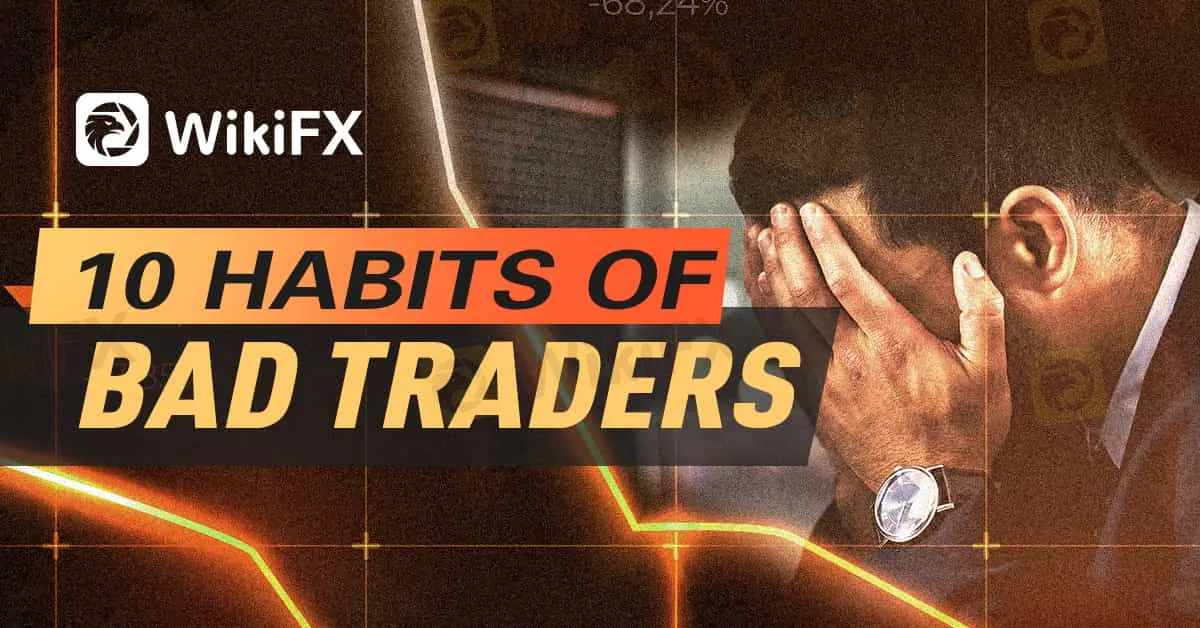简体中文
繁體中文
English
Pусский
日本語
ภาษาไทย
Tiếng Việt
Bahasa Indonesia
Español
हिन्दी
Filippiiniläinen
Français
Deutsch
Português
Türkçe
한국어
العربية
10 Habits of Bad Traders
Abstract:Forex trading can be unforgiving, especially for traders who possess certain habits that can lead to substantial losses. In this article, we'll explore ten habits that characterize bad traders in Europe and ways to avoid them.

Forex trading can be unforgiving, especially for traders who possess certain habits that can lead to substantial losses. In this article, we'll explore ten habits that characterize bad traders in Europe and ways to avoid them.
Overtrading: Bad traders have a compulsion to trade excessively, even when market conditions are unfavorable. This habit leads to increased transaction costs and potential losses.
Ignoring Risk Management: Bad traders often neglect risk management, putting a significant portion of their capital at risk on a single trade without proper risk control measures.
Lack of Patience: Impatience can be detrimental in forex trading. Bad traders jump into trades hastily without waiting for suitable entry and exit points.
Emotional Trading: Bad traders allow emotions to govern their decisions, leading to erratic trading behavior based on fear or greed.
Greed for Quick Profits: Bad traders seek quick profits and often engage in high-risk strategies, neglecting the importance of sustainable and consistent growth.
No Trading Plan: Bad traders lack a well-defined trading plan and often trade impulsively without a clear strategy in mind.
Ignoring Market Analysis: Instead of conducting thorough analysis, bad traders rely on hearsay or gut feelings, leading to uninformed decisions.
Revenge Trading: After experiencing a loss, bad traders engage in revenge trading, trying to recoup their losses quickly. This approach rarely ends well.
Lack of Learning: Bad traders are resistant to learning and improvement. They refuse to acknowledge mistakes and miss out on opportunities to grow.
Not Seeking Reliable Resources: Bad traders miss out on valuable resources like WikiFX, which provides crucial information, broker reviews, and educational content to help traders make informed decisions. Avoid these bad habits and check out WikiFX today to enhance your trading knowledge and skills.

Disclaimer:
The views in this article only represent the author's personal views, and do not constitute investment advice on this platform. This platform does not guarantee the accuracy, completeness and timeliness of the information in the article, and will not be liable for any loss caused by the use of or reliance on the information in the article.
Read more

Gold Prices Waver as Fundamentals Remain in Tug-of-War
Gold remains stuck in a sideways range, with $3,300 acting as a key technical pivot.

SFC Issues Restriction Notice to GA (Int’l) Capital Management Limited Over Regulatory Concerns
The Securities and Futures Commission (SFC) of Hong Kong has issued a restriction notice against GA (Int’l) Capital Management Limited (GCML), raising serious concerns about the firm’s integrity, reliability, and competence in carrying out its regulated activities.

Nonfarm Data Lifts Market Sentiment, U.S. Stocks Rebound Strongly
U.S. nonfarm payrolls for May slightly exceeded expectations, stabilizing investor sentiment and easing fears of a hard landing. This upbeat data sent U.S. equities broadly higher, led by tech stocks, with the Dow and S&P 500 posting significant gains. However, behind the optimism lies a fresh round of market debate over the Federal Reserve’s rate path, with uncertainty around inflation and interest rates remaining a key risk ahead.

Oil Price Breakout Incoming? Investors Should Stay Alert
Oil prices are hovering around a critical level, with potential yet to be fully unleashed. Investors must prepare for sudden changes.
WikiFX Broker
Latest News
OctaFX and XM Trading Platforms to Be Blocked in Singapore
ATFX Opens New Office in Cape Town's Portside Tower to Expand in Africa
Tighter Scrutiny: Finfluencers Face Global Crackdown Amid Rising Risks
IronFX: A Closer Look at Its Licences
2025 Broker Real - World Reviews: Share Your Insights & Grab Thousands in Rewards!
Eid ul Adha Celebration Continues – Grab the STARTRADER Offer Now!
Nonfarm Data Lifts Market Sentiment, U.S. Stocks Rebound Strongly
Interactive Brokers Enhances PortfolioAnalyst with New Features
WikiFX Forex Community Expert AMA
Interactive Brokers Enhance Account Security with FDIC Coverage
Currency Calculator


